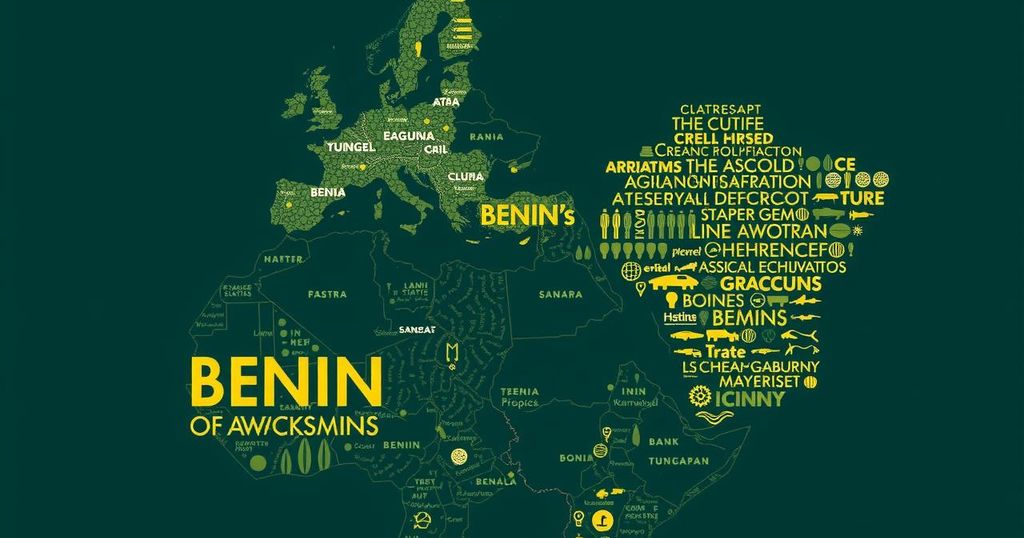Economic Overview of Benin: Challenges and Opportunities

Benin’s economy has largely depended on external support since independence, experiencing significant stagnation and low living standards. Initially structured along socialist lines post-coup, corruption persisted despite reforms. Agriculture employs 70% of the workforce, contributing to self-sufficiency in staple foods, while the industrial sector grows slowly. Trade dynamics, heavily reliant on agriculture, are challenged by informal trade with Nigeria. Infrastructure remains underdeveloped, affecting transportation and economic potential.
Since gaining independence, Benin has relied heavily on external support for its economic sustenance, predominantly from France and various international organizations. This aid has somewhat mitigated the persistent economic stagnation and low living standards affecting the majority of its citizens. Following a coup in 1972, the regime undertook efforts to restructure the economy along socialist lines, nationalizing numerous sectors and seeking closer ties with the Soviet Union and its neighbors. However, despite these attempts at reform, corruption remained rampant, and the overall economic situation showed little improvement. By the mid-1980s, efforts to liberalize the economy failed to yield positive changes, leading to a transition towards privatization in the early 1990s.
The natural resources of Benin primarily consist of tropical forests, rich aquatic habitats, and various mineral deposits. Remaining forest areas, mainly in the southwest, host valuable hardwoods, while the country’s rivers and lagoons are abundant in fish. Notably, offshore oil was discovered in 1968, and mining for minerals like iron ore and chromium has also been established. The agricultural sector, which employs around 70 percent of the population, has shifted focus towards achieving self-sufficiency in staple foods, leading to increased outputs of yams, maize, and cotton.
Benin’s industrial landscape includes palm oil processing plants, cement factories, cotton ginning facilities, and various food processing establishments, including breweries and soft-drink production. Electricity generation in Benin is facilitated by both thermal and hydroelectric sources, with power importation from Ghana meeting a significant portion of demand. The financial landscape underwent a transformation in the late 20th century as state-owned banks were privatized, paving the way for new private banking institutions. This restructuring coincided with increased foreign aid for development initiatives.
In terms of trade, Benin heavily relies on the export of agricultural products, such as cotton and palm oil, while informal trade dynamics with Nigeria influence its trade balance negatively. The deepwater port in Cotonou remains a key asset that facilitates trade with neighboring countries but remains underexploited. Conversely, the country has a diverse import portfolio, including manufactured goods and machinery sourced from various nations.
Transportation in Benin comprises a limited network of paved roads and a railway linking Cotonou to Parakou. Although there are navigable rivers and lagoons, the overall infrastructure remains lacking, particularly in rural areas. Cotonou stands as the country’s primary port and is complemented by an international airport that connects Benin to broader regions in Africa and Europe.
Benin’s economy has historically been characterized by dependency on external financial aid and fluctuating political regimes. The nation’s economic development has faced multiple challenges, including corruption, reliance on cash crops, and infrastructure deficits. The shift from socialist governance to more privatized, market-oriented reforms reflects broader changes in the political landscape beginning in the late 20th century, transitioning from heavy state control to individual initiative and foreign investment. Benin’s unique geographical position offers both opportunities and limitations in trade and resource management, contributing to the complexity of its economic positioning in the region.
In conclusion, Benin’s economy illustrates a complex interplay of dependency on external support, historical political transformations, and a gradual shift towards market liberalization. The nation’s resources, including agriculture and fishing, remain critical to its livelihood, yet significant challenges like corruption and infrastructural deficiencies continue to stall economic progress. With the potential for growth from trade, particularly through its deepwater port, Benin must navigate structural reforms and leverage international partnerships to enhance economic resilience and prosperity.
Original Source: www.britannica.com








